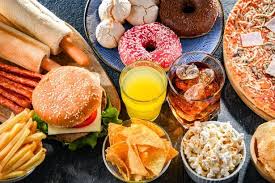Food Fight! 5 Combinations Your Tummy Wishes You'd Stop
Are your food choices causing digestive distress? Discover 5 common food combinations that might be wreaking havoc on your gut.
HEALTHBLOG-LIST
4/24/20253 min read


We all love a good food pairing, but sometimes, what tastes good together can cause a rumble in your tummy. While the concept of "food combining" can get a bit complex, there are a few surprisingly common food combinations that are best to avoid. Why? Because they can hinder digestion, lead to bloating, and leave you feeling sluggish. Let's explore 5 of these tummy-troubling duos so you can make smarter choices and keep your digestion happy!
In Brief
This article explores five food combinations that can potentially hinder digestion: milk and banana, beans and eggs, cola and pizza, alcohol and energy drinks, and ramen with milk. It explains why these combinations may cause digestive discomfort.
Table of Contents
Food Combining 101: Why Does It Matter?
Milk and Banana: A Slow-Digesting Duo
Beans and Eggs: The Gassy Combination
Coca Cola and Pizza: A Sugar and Fat Overload
Alcohol and Energy Drinks: A Recipe for Disaster
Ramen and Milk: The Starch and Dairy Struggle
General Tips for Better Food Combining
Important Considerations
Frequently Asked Questions (FAQs)
Conclusion
1. Food Combining 101: Why Does It Matter?
The idea behind food combining is that certain foods require different enzymes and digestive environments to break down properly. Combining foods that digest at drastically different rates or require conflicting digestive processes can potentially lead to:
Slowed Digestion
Bloating and Gas
Reduced Nutrient Absorption
General Digestive Discomfort
Note: While food combining is a popular concept, it's important to remember that individual digestive responses can vary. What bothers one person may not bother another.
2. Milk and Banana: A Slow-Digesting Duo
The Issue: Milk and bananas are both considered heavy foods that can take a long time to digest. Combining them can leave you feeling sluggish and bloated.
Why It's Problematic: Milk digests best on its own or with lighter foods. Bananas are high in sugar and can ferment in the gut when combined with milk.
3. Beans and Eggs: The Gassy Combination
The Issue: Beans are high in fiber and complex carbohydrates, while eggs are rich in protein. Both of these food groups require significant digestive effort, and combining them can lead to increased gas production and bloating.
Why It's Problematic: Both can also cause cramping in the stomach
4. Coca-Cola and Pizza: A Sugar and Fat Overload
The Issue: This classic combo is a recipe for a blood sugar rollercoaster. Pizza is high in refined carbohydrates and fats, while Coca Cola is loaded with sugar. This can lead to a rapid spike in blood sugar followed by a crash, leaving you feeling tired and craving more.
Why It's Problematic: Also, the acidity of soda can interfere with the digestion of the pizza’s crust.
5. Alcohol and Energy Drinks: A Recipe for Disaster
The Issue: Combining alcohol and energy drinks is a dangerous mix. Energy drinks can mask the depressant effects of alcohol, leading you to drink more than you realize.
Why It's Problematic: This can increase your risk of alcohol poisoning, dehydration, and heart problems. Additionally, energy drinks can further irritate the stomach when it's already processing alcohol.
6. Ramen and Milk: The Starch and Dairy Struggle
The Issue: Ramen is high in sodium, heavily processed carbohydrates, and often contains unhealthy fats. The body is under stress trying to digest it.
Why It's Problematic: In addition, Ramen is a low fiber food making it hard to digest.
7. General Tips for Better Food Combining
Eat Fruits Separately: Fruits digest quickly and are best consumed on an empty stomach.
Combine Starches with Non-Starchy Vegetables: This combination is generally easier to digest than combining starches with protein.
Choose Simple Meals: Avoid overloading your digestive system with too many different types of foods at once.
Listen to Your Body: Pay attention to how you feel after eating different food combinations and adjust your diet accordingly.
Chew Your Food Thoroughly: This aids in digestion.
8. Important Considerations
Individual Variation: Food sensitivities and digestive capabilities vary greatly from person to person.
Overall Diet Matters: The impact of food combinations is less significant if you have a generally healthy and balanced diet.
Not a Substitute for Medical Advice: If you have persistent digestive issues, consult with a doctor.
9. Frequently Asked Questions (FAQs)
Q: Is it really that bad to eat milk and bananas?
A: For some people, it can cause digestive discomfort. Pay attention to how you feel after eating this combination.
Q: What are some better alternatives to these food combinations?
A: Try eating fruits on their own, pairing proteins with non-starchy vegetables, and choosing water over sugary drinks.
Q: Should I avoid these food combinations completely?
A: Not necessarily. The goal is to be mindful of how different foods affect you and make choices that support your digestive health.
Q: Can probiotics help with food combining issues?
A: Probiotics can support a healthy gut microbiome, which may improve digestion overall.
Q: Where can I find more information about food combining?
A: While food combining is a popular concept, scientific evidence to support all of its claims is limited. Focus on building your diet around whole, unprocessed foods.
10. Conclusion
While the idea of specific food combinations causing serious harm is often overblown, being mindful of how different foods affect your digestion can be a helpful strategy for feeling your best. By avoiding these 5 common food pairings and paying attention to your body's signals, you can support a happier, healthier tummy and enjoy your meals without the digestive drama.
